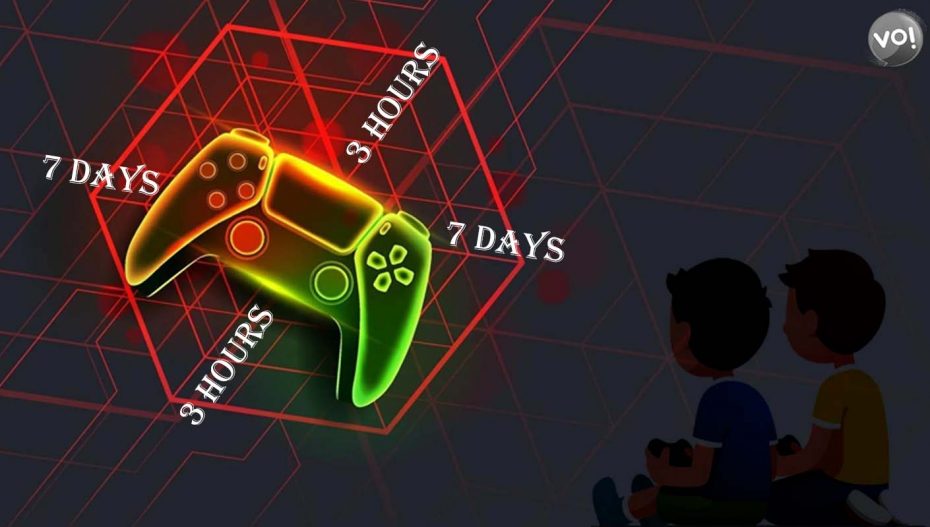Covid-19 has changed the way we work, study and even play, bringing about changes that are more permanent than temporary. And one of the biggest side effects of our largely virtual existence has been the increased screen time in children. Parents have tried every trick in the book from equipping their phones and tablets with blue light glasses to limiting online time, but not many have succeeded in implementing them.
China recently released a national mandate limiting minors to only three hours of gaming per week
China’s National Press and Publication Administration has made new rules for online gaming companies. Under these new mandates, companies cannot offer online games to those under the age of 18 except on Fridays, Saturdays and Sundays and that too only between 8 pm and 9 pm. They are allowed to play during the same time on national holidays as well.
The new rules also mention that companies must ensure that players are using their true identity to sign up and need to prevent people who do not use their true names from logging on.
This is not the country’s first attempt at limiting screen time for minors. In 2019, they issued rules that dictated that minors can play online games only for 90 minutes a day and were strictly forbidden from playing between 10 pm and 8 am. It also limited the monthly spending on microtransactions for individuals below the age of 18 with the maximum amount ranging from $28 to $57 depending on the child’s age.
VoI spoke to a few teachers about the implementation of this rule in China
Bhumir Shah from Navchetan School, Paldi says the problem is bigger than just screen time. “Video game addiction is the problem, not video games. Any activity under the guidance of a parent is performed in a better manner. Limiting the time will not be sufficient.” He added that children also learn from video games sometimes.

Meenakshi Sharma, an Economics Teacher from Aavishkar International School says, “Children should go out and play. If they are playing inside, they should play board games as there is no benefit to video games.” She adds, “However, I completely disagree with the limited time slots. The focus should be on playing other outdoor and indoor games.”

“Children need to be learning something that helps them grow, I do not feel video games help as there is a security threat as well on the internet,” says Mamta Gupta from Balmandir School. “The kids should not be bound by the time either in playing or studying,” she added.

Teachers unanimously agree that video gaming addiction has adverse effects on children but limiting their time is not the solution.
Parents, on the other hand, agreed with China’s decision.
Rati Lal, who is raising a young daughter, says, “During the pandemic, outdoor activities are very limited, everything is online. So, this decision is of utmost importance right now and I completely support this decision.”

Dr Richa Mehta, an advocate and a parent of a tenth grader says, “It is the need of the hour but at the same time puts curbs on the freedom of children.”
“Certain strict guidelines are needed considering the implications on their mental health and every country should try to implement it in some manner,” she asserts.

It could be very helpful in improving cognitive skills
On the other hand, Niraj Harlalka, a professor and a parent to two daughters, says, “Video games provide a distinct learning experience especially those which have an element of brain stimulation. I am a fan of gaming and if done right, it could be very helpful in improving cognitive skills such as visualization and problem-solving, and it also teaches determination.”

Mostly, the parents are of the view that this is a good implementation but there are a few who believe that gaming does have certain advantages
While parents and teachers remain divided on the issue, kids have their own two bits to add.
Kimaya Rana from Zydus School of Excellence says, “As the pandemic began, most of the children had the choice to use their time either productively or inefficiently. Sadly, most of them chose the latter, so these restrictions may have become necessary at this point.”

Samaira Jindal from AIS says, “A child should be allowed to make a choice, these rules leave no room for any freedom.”
Children might make their own virtual world
Anish Ganpathy, a student at Anand Niketan School, says, “This is a much-needed development. Otherwise, children will lose contact with the world around them and make their own virtual world.” He added, “Video games can also be very addictive if played for a long time and more screen time can harm one’s eyes.”













